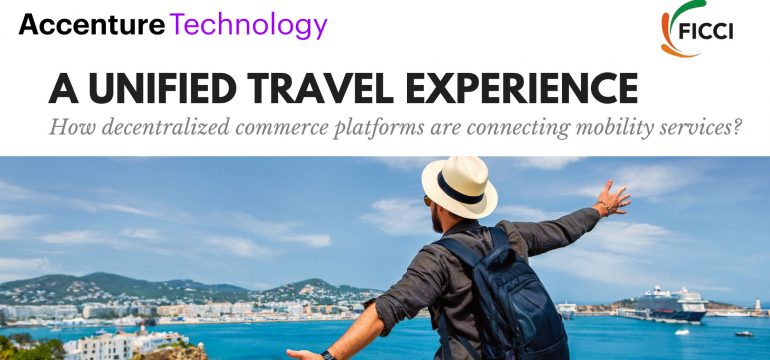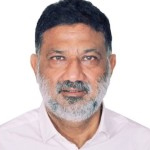The future of travel is seamless, but are we there yet?
The vision for travel is a seamless, interconnected experience, but how close are we to achieving it? Imagine booking all aspects of your trip—ride-share to airport, public transport for site-seeing, bike rental for cultural immersion, flights, local experiences and a nice place to stay—on a single integrated platform. Our recent research finds out – every 2 out of 3 travelers said that they use up to 10 sites / apps to pull together the information they need 1. This is directly leading to increased costs for the travel players and highly fragmented traveler experiences.
Generative AI-powered solutions, viz. Booking.com’s AI Trip Planner2 and Trip.com’s TripGenie3 are already taking strides in making travelers’ experience better, offering them personalized, one-stop access to a range of travel services.
What if such range of services – from flights to experiences and for every traveler wallet from budget to luxury – got networked across providers and aggregators? What if these were seamlessly available in one marketplace, thus creating a truly unified travel experience possible – a personalized connected trip experience? What if such connectedness is further amplified by agentic solutions, so you get the full dynamic trip package customized real-time as you interact with the Generative AI trip planning agents.
Decentralized Commerce Platforms (DCPs) are on their way to making this possible by utilizing open networks, artificial intelligence (AI), and smart contracts to transform how we access, purchase and use travel services. Unlike traditional closed marketplaces, DCPs create an open ecosystem where multiple service providers can seamlessly integrate, enable multiple routes to market, promoting healthy competition, and reducing intermediation costs.
Recognizing the need for a more connected and digitalized travel ecosystem, the Federation of Indian Chambers of Commerce and Industry (FICCI) and the Open Network for Digital Commerce (ONDC) have signed a Memorandum of Understanding (MoU) to modernize the travel, tourism, and hospitality industries4. This partnership aims to digitize India’s travel sector by working closely with businesses and government entities. Through training programs, industry advocacy, and promotional activities, FICCI and ONDC will drive the adoption of digital commerce, making travel services more accessible and cost-efficient.
The key to a connected travel ecosystem
Unlike traditional online marketplaces, which run as closed systems controlled by one entity, DCPs create an open connected network where several service providers can seamlessly work together. This makes services easier to use by empowering travellers with more choices and ways to purchase.
How DCPs enable seamless connectedness and mobility?
DCPs are redefining travel by combining different services – especially taking a lead with transportation into a smooth, efficient, and for-all-budgets ecosystem. Here is how they are making mobility and travel smarter and more connected:
- Open Network Architecture: DCPs promote interoperability, which enables mobility providers to include their offerings into a large ecosystem marketplace, in contrast to marketplaces or channels managed by travel providers or aggregators that require 1:1 integration. Finland’s Mobility-as-a-Service (MaaS) model5 is a prime example, offering travellers a unified transport platform, and has been evolving for over a decade now.
- Smart contracts for automation: By doing away with the need for middlemen, these self-executing contracts guarantee quicker reservations, automatic payments, and prompt reimbursements when necessary.
- AI-driven personalization: By analysing real-time data aggregated for a very large traveller base across multiple travel / transportation providers, AI can improve the traveller’s experience by offering more intelligent trip suggestions, dynamic pricing and improved route optimizations. This further gets into action when autonomous agents recommend optimized flight routes based on weather conditions or a hotel kitchen is recommended the optimized food prep for minimized food waste by considering on current occupancy and predicted walk-ins based on weather conditions.
- Built upon the principle of trust with Blockchain: Open marketplaces and Artificial Intelligence have one fundamental principle in common – trust is the limit of their limitless possibilities. Our research finds that 77% of executives6 believe unlocking the true benefits of AI will only be possible when it’s built on a foundation of trust. With DCPs powered by blockchain, transactions are stored on a decentralized ledger that cannot be altered, lowering the possibility of fraud and guaranteeing safety of transaction and data security for all participants – travelers, hotels, airlines, service providers, agencies, et. al.
- Cost efficiency and consumer empowerment: DCPs, in addition to aggregator-driven platforms, provide additional direct ways to purchase, which promotes healthy competition and results in more equitable revenue distribution among the providers & resellers. Open networks can reduce the cost of digital commerce, as demonstrated by India’s ONDC program.7 More options and direct access to service providers improve flexibility and transparency in pricing for travelers.
DCPs are establishing the groundwork for a genuinely connected, cost efficient, and decentralized travel economy by improving accessibility, resolving inefficiencies and expanding the marketplace efficacy itself.
Decentralized mobility in action in India
India’s Open Network for Digital Commerce (ONDC), launched in April 2022, democratizes digital commerce by creating an open, platform-independent network connecting buyers, sellers, and service providers. It reduces transaction costs, increases market access, and empowers businesses.
- ONDC saw 15+ million orders in January 2025 8, with mobility services contributing 8+ million transactions.
- Namma Yatri9: An ONDC-based, zero-commission mobility app that enhances financial stability for drivers, generating ₹1,100 crore in earnings.
- The decentralized ONDC network has also enabled many community-led growth initiatives in mobility, where a city’s auto/taxi unions are championing digital mobility transactions in the city.
- ONDC’s white paper10 projects that open-network mobility apps could save drivers ₹20,000 crore annually while boosting the economy by ₹3 lakh crore in five years.
- Supply of metros across India is being made available in the network, enabling accessibility of these services via various buyer apps to boost digital ticketing.
- Innovative use cases such as multi-modal transport can now become a reality in India, as almost all modes of transport are available in the ONDC network. This significantly improves efficiency for travelers and creates a connected trip experience—first mile, mid-mile, and last mile.

With the FICCI-ONDC partnership focusing on expanding digital tourism, India is poised to accelerate the adoption of these decentralized travel solutions. This initiative will not only
help businesses expand their market reach but also empower travelers with a more seamless and cost-effective experience.
The future of decentralized mobility
With Web3, blockchain, artificial intelligence, and decentralized identity management, DCPs are enabling secure, transparent, and efficient travel experiences. Tokenized tickets and peer-to-peer ridesharing reduces reliance on a limited set of purchase points, but challenges such as infrastructure gaps, data privacy concerns, and regulatory barriers must be addressed.
By embracing decentralized models along with the power of AI (Generative, Agentic, and Physical), travel players including airlines, hotels, mobility providers, and travel agencies can improve interoperability, create end-to-end solutions, curate personalized experiences like never before, and unlock new revenue streams.
- .
- 1: https://www.accenture.com/in-en/insights/travel/travel-industry-new-trip
- 2: https://news.booking.com/bookingcom-enhances-travel-planning-with-new-ai-powered-features–for-easier-smarter-decisions
- 3: https://www.trip.com/tripgenie/
- 4: https://travel.economictimes.indiatimes.com/news/associations/ficci-ondc-sign-mou-to-transform-digital-experience-in-travel-tourism-hospitality-industry/116386753?utm_source=linkedin_web&utm_medium=social&utm_campaign=socialsharebuttons
- 5: https://www.accenture.com/us-en/insights/automotive/transforming-future-mobility-services
- 6: https://www.accenture.com/us-en/insights/technology/technology-trends-2025
- 7: https://pib.gov.in/PressReleasePage.aspx?PRID=2090097
- 8: https://www.moneycontrol.com/news/business/startup/ondc-cuts-dec-incentive-payout-by-33-to-rs-40-lakh-records-14-4-mn-transactions-in-nov-12887258.html
- 9: https://nammayatri.in/
- 10: https://www.business-standard.com/companies/start-ups/namma-yatri-s-eyes-to-transform-mobility-space-with-zero-commission-model-124122001015_1.html
- 11: https://nammayatri.in/
- 12: https://www.business-standard.com/companies/start-ups/namma-yatri-s-eyes-to-transform-mobility-space-with-zero-commission-model-124122001015_1.html
- 13: https://www.accenture.com/content/dam/accenture/final/a-com-migration/r3-3/pdf/pdf-171/accenture-distributed-ledger-technology-automotive.pdf?utm










Leave a Reply